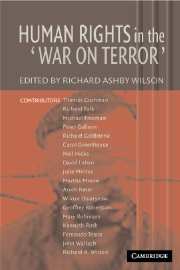Book contents
- Frontmatter
- Contents
- List of Contributors
- Acknowledgements
- HUMAN RIGHTS IN THE ‘WAR ON TERROR’
- Introduction
- 1 Order, Rights and Threats: Terrorism and Global Justice
- 2 Liberal Security
- 3 The Human Rights Case for the War in Iraq: A Consequentialist View
- 4 Human Rights as an Ethics of Power
- 5 How Not to Promote Democracy and Human Rights
- 6 War in Iraq: Not a Humanitarian Intervention
- 7 The Tension between Combating Terrorism and Protecting Civil Liberties
- 8 Fair Trials for Terrorists?
- 9 Nationalizing the Local: Comparative Notes on the Recent Restructuring of Political Space
- 10 The Impact of Counter Terror on the Promotion and Protection of Human Rights: A Global Perspective
- 11 Human Rights: A Descending Spiral
- 12 Eight Fallacies About Liberty and Security
- 13 Our Privacy, Ourselves in the Age of Technological Intrusions
- 14 Are Human Rights Universal in an Age of Terrorism?
- 15 Connecting Human Rights, Human Development, and Human Security
- 16 Human Rights and Civil Society in a New Age of American Exceptionalism
- Index
- References
1 - Order, Rights and Threats: Terrorism and Global Justice
Published online by Cambridge University Press: 18 August 2009
- Frontmatter
- Contents
- List of Contributors
- Acknowledgements
- HUMAN RIGHTS IN THE ‘WAR ON TERROR’
- Introduction
- 1 Order, Rights and Threats: Terrorism and Global Justice
- 2 Liberal Security
- 3 The Human Rights Case for the War in Iraq: A Consequentialist View
- 4 Human Rights as an Ethics of Power
- 5 How Not to Promote Democracy and Human Rights
- 6 War in Iraq: Not a Humanitarian Intervention
- 7 The Tension between Combating Terrorism and Protecting Civil Liberties
- 8 Fair Trials for Terrorists?
- 9 Nationalizing the Local: Comparative Notes on the Recent Restructuring of Political Space
- 10 The Impact of Counter Terror on the Promotion and Protection of Human Rights: A Global Perspective
- 11 Human Rights: A Descending Spiral
- 12 Eight Fallacies About Liberty and Security
- 13 Our Privacy, Ourselves in the Age of Technological Intrusions
- 14 Are Human Rights Universal in an Age of Terrorism?
- 15 Connecting Human Rights, Human Development, and Human Security
- 16 Human Rights and Civil Society in a New Age of American Exceptionalism
- Index
- References
Summary
The Challenge of Terrorism
In 2002, the International Council on Human Rights Policy published a report entitled Human Rights After September 11, based on an international seminar of distinguished human-rights scholars and practitioners (International Council on Human Rights Policy, hereafter ICHRP, 2002). The title implied that human rights after 9/11 were different from human rights before 9/11. How could that be?
Human rights are commonly thought to be ‘timeless’, because they are grounded in ‘the dignity and worth of the human person’. However, they have a history. After the adoption of the Universal Declaration of Human Rights in 1948, the struggle for human rights took place in a world dominated by the Cold War and the consequences of decolonization. The period from the mid-1980s to 2001 witnessed a surge of human-rights optimism, as many countries made the transition from authoritarianism to democracy. There were human-rights disasters in this period, such as the Rwandan genocide and the conflicts in the former Yugoslavia, but, overall, the idea of human rights moved from the margins to the centre of international politics. The events of 9/11 seemed to bring an abrupt change. The dominant terms of political discourse became ‘terrorism’, ‘security’ and ‘war’. It is true that ‘terrorism’ was represented as a threat to Western values, including human rights, and the wars in Afghanistan and Iraq toppled two regimes that had been massive human-rights violators. Nevertheless, human-rights activists have generally believed that the ‘war on terrorism’ has created new challenges for their cause.
- Type
- Chapter
- Information
- Human Rights in the 'War on Terror' , pp. 37 - 56Publisher: Cambridge University PressPrint publication year: 2005



